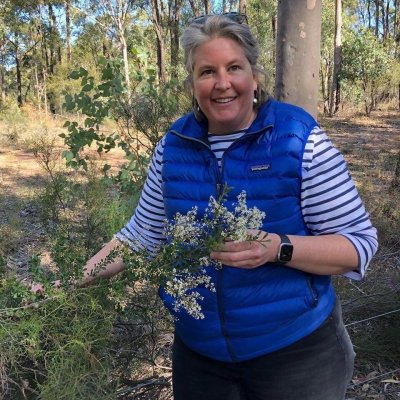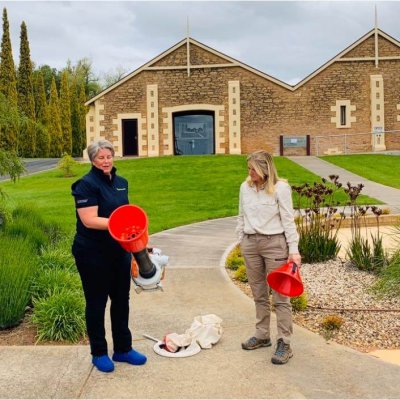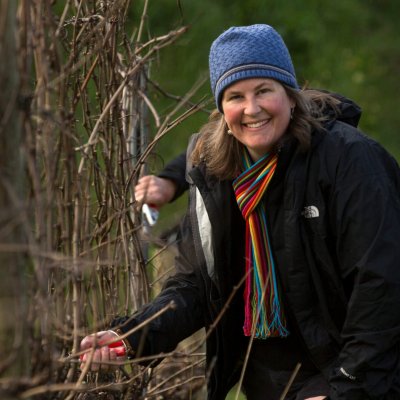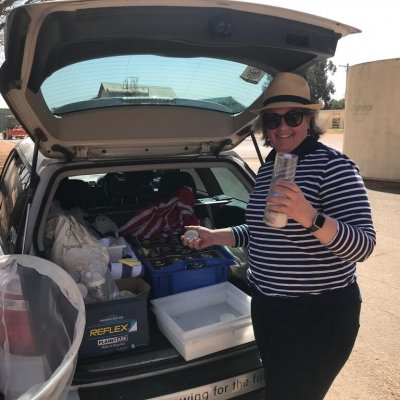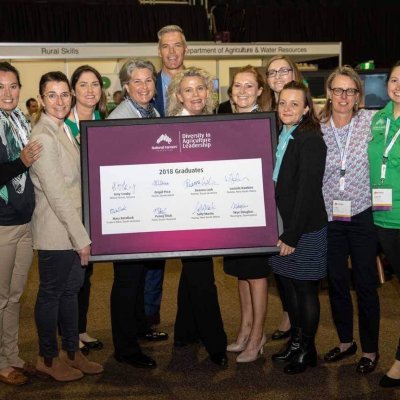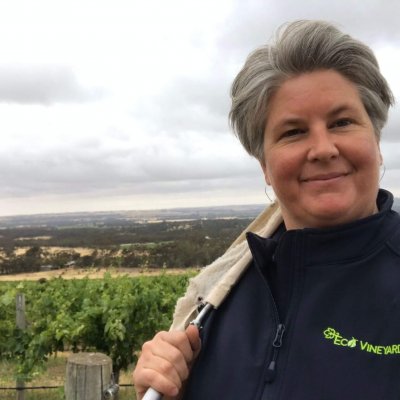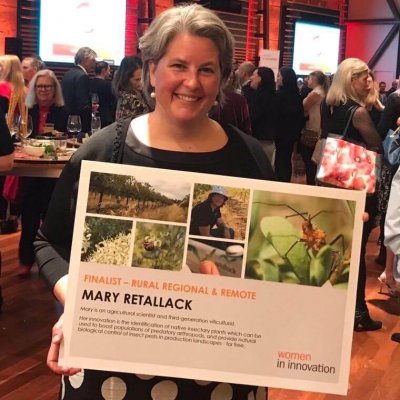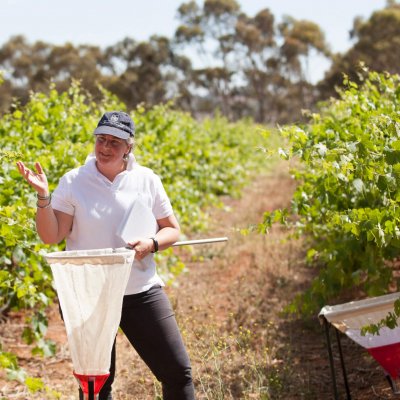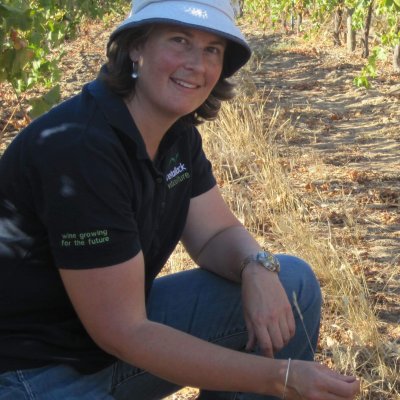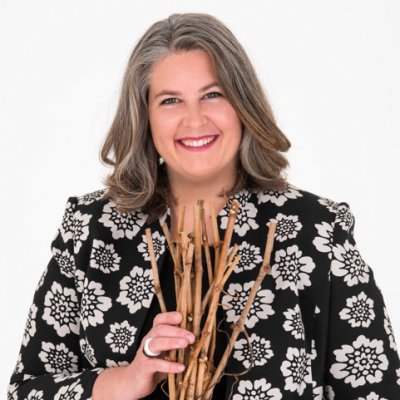A quiet over achiever, Mary thrives off of challenging the status quo in order to create positive change. Often, that change involves nurturing others to fulfil their potential – particularly rural women – by enabling them with a sincere and abundant offering of empathy, patience and kindness. Growing up on a fruit block in South Australia’s Riverland, she originally studied to become a Park Ranger however ended up moving to the wine sector, establishing herself as a world-renowned Viticultural Consultant. Mary is the proud beneficiary of a PhD in the biocontrol of insect pests, of which her valuable contribution to the EcoVineyards project has been a testament to her desire to help grape growers produce healthier, more resilient and more functionally biodiverse vineyards. In 2017, she was inducted into the Businesswomen’s Hall of Fame and in 2012, she was named both the state and the national winner of the Rural Industries Research and Development Corporation (now AgriFutures) Rural Women’s Award. Today, Mary lives in the Adelaide Hills on an apple orchard and splits her time between consulting and sitting on a range of boards and advisory panels in Australia and overseas.
When asked what concerned Mary about the health, safety and wellbeing of those in rural industries and communities, she acknowledged the importance of mental health. “Mental health is a big challenge for many and it expresses itself in many ways,” she says. Mary recommends taking time to talk about challenges upfront and in setting healthy boundaries early on, to help prevent things from getting out of hand. “Leading by setting expectations and following through with lots of small, incremental changes can result in positive outcomes – especially when cultural change is the goal.” She also believes it’s important for rural women to feel comfortable about putting their own needs first and does this herself by scheduling time in her diary every day to recharge. “I walk the dog before I start my work day, I highly recommend it!”
How would you describe yourself in three words?
A nurturer, an adventurer and a doer.
Tell us something interesting about yourself...
I grew up on a fruit block in the Riverland and have always liked working outside. I left home at the age of 16 to study to become a Park Ranger. Ironically, I ended up working in the wine sector as a viticulturist and have worked in a range of roles both in Australia and overseas over the past 25 years.
I now split my time between consulting nationally and sitting on a range of boards and advisory councils/panels, both here and overseas.
I live in the Adelaide Hills on a small apple orchard/vineyard and enjoy the flexibility of working from home. I like to ride a Vespa when the weather is sunny.
What achievements are you most proud of?
Completing a PhD on the role of native insectary plants and their capacity to support populations of good bugs that contribute to the biocontrol of insect pests.
I’m able to share this information with growers via the EcoVineyards project (funded by Landcare in conjunction with the Wine Grape Council of SA) and it’s great to play a part in enhancing functional biodiversity and ultimately the resilience of production systems. It’s about working smarter rather than harder.
Natural climate solutions (eg, planting trees) is also a great way to combat the effects of climate change.
What makes you truly happy?
Challenging the status quo to create positive change.
What do you love the most about being a rural woman?
Having the freedom and flexibility to do what is important to me.
Tell us about a time when you felt worried about your own or someone else’s health, safety or wellbeing.
Mental health is a big challenge for many, and it expresses itself in many ways, from subtle challenges in everyday life to burnout and incapacitation for periods of time. Mental health is just as important as physical health.
Generosity, kindness, empathy and patience go a long way in nurturing others to reach their full potential, at whatever stage they are in life.
What practical things did - or could - you or someone else do to prevent yourself or someone else from getting hurt?
Take the time to talk about challenges and ways to set healthy boundaries before things get too out of hand or result in an accident. As a recovering perfectionist, I have learnt that good enough, is quite often good enough (and no one notices!). It helps to remove some of the self-imposed pressure and unrealistic expectations.
Also, take the time to SLOW DOWN!
"It's okay to say no, create healthy boundaries and put your needs first. I quite like using the complete sentence: 'Sorry, I am unable to do that at the moment' – no qualifiers needed."
Mary Retallack, Crafers West, South Australia AU Tweet this
Is there a time, place or scenario when your partner or those you work or spend time with are more willing to make changes to the way the work is done, or are more open to making safer, healthier choices?
Usually, when things go wrong the change is a reactive response. Wouldn’t it be great if we could head things off when they are small and before they become big challenges?
Leading by setting expectations and following through with lots of small incremental changes can result in positive outcomes especially when cultural change is the goal.
If you could give any advice to another rural woman about health, safety and/or wellbeing in rural industries and communities, about influencing change in business - or just in general - what would it be?
Ask yourself, is it in my best interest? It is okay to say no, create healthy boundaries and put your needs first. I quite like using the complete sentence: “Sorry, I am unable to do that at the moment” – no qualifiers needed.
Take time out every day to recharge (schedule it in your diary). I walk the dog before I start my work day, I highly recommend it!
Is there anything else you'd like to share?
Don’t be too hard on yourself – life is a journey and we are all learning.
PS. I’d like to share that Alex is a bloody legend, too!
